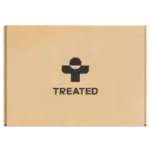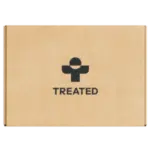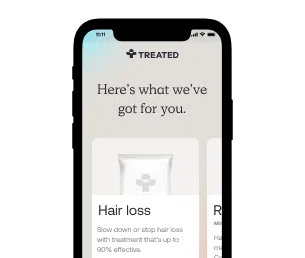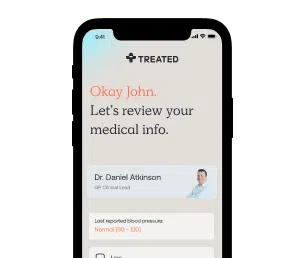Tonsillitis
Get effective relief from sore throat and swelling.
Secure delivery
UK clinicians
Tonsillitis is an infection that affects the tonsils at the back of your throat, causing them to become red and swollen.
Our experts can recommend treatments that are tailored for you. Order tonsillitis treatment online to get effective relief for your symptoms.
Tonsillitis is an infection that causes inflammation or swelling at the back of the throat, which can be painful or uncomfortable. It’s usually caused by a viral infection, such as the cold or flu, but it can also be the result of a bacterial infection. A lot of the time symptoms will ease within about three to four days, but this can vary in length.
Although tonsillitis in itself isn’t contagious, the viruses and bacteria that cause it are - so it can still spread to others. How long someone is contagious for depends on what germ is causing tonsillitis. Generally speaking, someone can be contagious for 24 to 48 hours before they develop symptoms, and can remain contagious until the symptoms go away. As a result, you should stay at home, use tissues, and wash your hands whenever you cough or sneeze if you have tonsillitis.
Tonsillitis is a common condition, and it can affect people of any age group. However it’s most commonly seen in children, with tonsillitis caused by bacteria being most common in children aged 5-15. And adults are more likely to get tonsillitis if they didn't have their tonsils removed as a child, live or work in close proximity to children or have a weakened immune system.
Tonsillitis is a very common condition. The exact number of people that it affects is not fully known, but it’s thought to affect around one in ten people each year. Research also suggests that recurrent tonsillitis is more common in females than males.

How we source info.
When we present you with stats, data, opinion or a consensus, we’ll tell you where this came from. And we’ll only present data as clinically reliable if it’s come from a reputable source, such as a state or government-funded health body, a peer-reviewed medical journal, or a recognised analytics or data body. Read more in our editorial policy.
Tonsillitis is usually caused by a viral infection, such as cold or flu. It can sometimes be caused by bacterial infections like strep throat as well, but this is a lot more rare.
The symptoms of tonsillitis can vary from person to person, though typically the most common symptoms include:
These symptoms can become more severe in some instances. When this occurs you may experience:
Tonsillitis can cause further problems, although it’s quite rare. In some instances it can cause another infection. When this occurs it can prevent you from being able to treat tonsillitis properly. If this is the case, and tonsillitis keeps coming back (or it’s getting harder to treat), then it’s more than likely that your clinician will recommend that your tonsils be removed.
Sometimes tonsillitis can lead to you developing an abscess between your tonsils and the wall of your throat, called a quinsy.

How we source info.
When we present you with stats, data, opinion or a consensus, we’ll tell you where this came from. And we’ll only present data as clinically reliable if it’s come from a reputable source, such as a state or government-funded health body, a peer-reviewed medical journal, or a recognised analytics or data body. Read more in our editorial policy.
There are a wide range of treatments available for tonsillitis. The first port of call will usually be to just get plenty of rest, and drink cool drinks to soothe your throat. After that, standard painkillers, such as paracetamol or ibuprofen are recommended, as well as gargling salty water.
The most effective way to treat tonsillitis, though, can sometimes be to use treatments focused on treating the underlying infection, such as antibiotics. There are also medications that can ease the symptoms of tonsillitis, such as Benzydamine. This medication numbs the throat and helps to bring down inflammation.
Antibiotics don’t tend to be used unless the infection fails to clear up and the cause is bacterial. The first treatment will usually involve easing your symptoms as much as possible. Sometimes this can be done by using lozenges, throat sprays and antiseptic solutions. But in situations where the cause is bacterial, antibiotics may be needed.
A lot of the time tonsillitis can clear up by itself within a week or so. By resting, taking over-the-counter medications and drinking cold fluids, you can ease your symptoms and allow the infection to clear up on its own. If your symptoms carry on, or develop into something more severe, then you might need to speak to a clinician to get a prescription treatment.

How we source info.
When we present you with stats, data, opinion or a consensus, we’ll tell you where this came from. And we’ll only present data as clinically reliable if it’s come from a reputable source, such as a state or government-funded health body, a peer-reviewed medical journal, or a recognised analytics or data body. Read more in our editorial policy.
Have something specific you want to know? Search our info below, or ask our experts a question if you can’t find what you’re looking for.
Tonsillitis. BMJ Clinical Evidence, [online] 2009, p.0503. [Accessed 17 Nov. 2021].
Tonsillectomy and tonsillitis in Cape Town--age and sex of patients. South African Journal of Surgery. Suid-Afrikaanse Tydskrif Vir Chirurgie, 38(3), pp.62–64. [Accessed 27 Mar. 2023].

The macrolide antibiotic for a range of conditions. Good option if you have a penicillin allergy.

Non-steroidal anti-inflammatory spray that tackles sore throat and tonsillitis symptoms.

Recommended tablet for bacterial tonsillitis. Clears up your symptoms in just a few days.

Like Difflam but cheaper. Antibiotic-free treatment for sore throat and tonsillitis.

Registered with GMC (No. 4624794)
Meet Daniel
Registered with GPhC (No. 2202465)
Meet Sanjeda
Registered with GPhC (No. 2070724)
Meet Craig
Always read the leaflet that comes with your medication and tell us about any side effects you get.
We know health, but you know you.
Our experts tell you what’s safe, but you decide what’s best.
Answer a few questions and tell us about yourself. Get tailored advice from our clinicians so you can choose better.

Choose your treatment and how often you have it delivered.

We know things change. It’s the nature of life. We’ll check in regularly to make sure your treatment is still right for you.
Pause. Change. Skip. Start again. Any time you like.
Here are some other things we can help with.
Choose from our range of tablets and solutions. Get ongoing care and support from our experts.
Stop smoking treatments that can help you kick the habit forever, and reduce your risk of disease.
Tablets or injections. Tailored weight loss treatments combined with ongoing support from our experts.
We're making healthcare more about you. Sign up to our newsletter for personalised health articles that make a difference.
Disclaimer: The information provided on this page is not a substitute for professional medical advice, diagnosis, or treatment. If you have any questions or concerns about your health, please talk to a doctor.
We couldn't find what you're looking for.
Here's everything we treat. Or, if you're looking for something we don't have yet, you can suggest something.
If there’s a particular treatment or condition you’re looking for, tell us and we’ll look into it for you.
Submit your question here, or tell us if you’ve found an issue on our site.
We’ll get back to you very soon. We aim to respond to all queries in one working day.
You’re signed up to our newsletter. Keep an eye on your inbox for our latest update.
By clicking 'Subscribe now' you're agreeing to our Privacy Policy.
We’ve sent you an email asking you to confirm your email address.